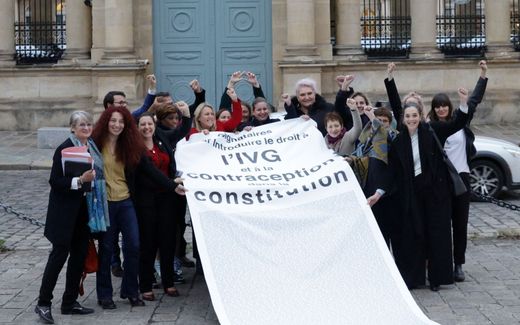Dutch politician wants to send abortion pills to Polish women

In this photo illustration, a person looks at an Abortion Pill (RU-486) for unintended pregnancy from Mifepristone. Photo AFP, Olivier Douliery
Western Europe
The progressive GroenLinks (Green Left) Party in the Netherlands wants to make Dutch abortion pills available for Polish women. Its proposal comes at a time when Poland is considering tightening its abortion laws.
Dutch doctors should offer the possibility to prescribe abortion pills from a distance, MP Corinne Ellemeet, a member of the GroenLinks party, proposed on Monday. With the abortion pills, women can terminate their pregnancy up to twelve weeks, the Dutch newspaper NRC reports.

If Dutch doctors can prescribe the pills after a digital consultation, Polish women no longer need to travel abroad for an abortion, Ellemeet reasons. "It is important to show international solidarity to help women in other places", she says. "The Netherlands plays a crucial role." Currently, Dutch organisations and clinics send thousands of abortion pills to Poland. However, the drugs must be sent via Canada or India and do not always arrive.
Law
Ellemeet points out that it is not difficult to allow Dutch doctors to provide abortion pills to Polish women. Only a small change in the law is needed for this. Currently, doctors need to hold a physical consultation with a patient before prescribing medicines. If this were changed, Ellemeet's plan could be carried out.
"In Poland, women are not acting illegally if they take an abortion pill. Only doctors and activists who provide the pills are. For Dutch physicians, however, there is no ban on providing health care in other countries if it is legal here. With this initiative, we offer women in the European Union a safe and legal route to terminate their pregnancy."
Illegal
Ellemeet presents her plan at a time when the Polish authorities are considering making the abortion law in the country stricter. If parliament passes the proposal, all help in getting an abortion will become illegal. Polish doctors would then not be allowed to point out the possibility of termination of pregnancy.
Poland is already one of the countries with the strictest abortion laws in Europe. The proposal of the Dutch politician leads to the question of how far EU countries can go in interfering with the national policies of other member states, NRC writes.
Questionable
Other critics, such as legal health care expert Martin Buijsen from the Dutch Erasmus University, say that it is essential for doctors to speak to their patients in person. "Providing pills after a digital consult only is second-rate health care."
In addition, the relationship between Poland and the Netherlands could become even more strained. Buijsen says that countries have the right to make their own policies concerning non-standard medical care, like abortion and euthanasia. "Every country makes its own choice, and the opinions are very diverse. Poland respects our policies and expects us to do the same."
Socialist politician Maarten Hijink is worried that women get problems with side effects after taking an abortion pill. "The aftercare has to be good as well, and it is questionable whether this is possible from a distance."
Related Articles









